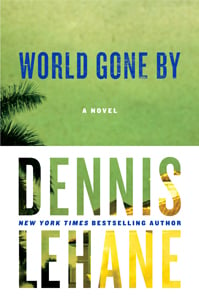Book review: A world gone by
There are no heroes in Lehane’s universe: The good guys are usually merely trying to make the best choice from an array of horrible options.
Share
 WORLD GONE BY
WORLD GONE BY
Dennis Lehane
Tony Soprano dragged himself to a shrink, but he was not a man of remorse. The protagonists in Dennis Lehane novels, however, are wracked with Irish-Catholic guilt. In Lehane’s first five books, it was the P.I. Patrick Kenzie who felt the sting as he blurred ethical lines to serve what he believed to be a higher sense of jus- tice. Here it’s Joe Coughlin, ex-con, rum-run- ner and former Mob boss now living in the straight world as a war profiteer in Tampa, Fla., circa 1942. Coughlin acts as a bridge between the Mob and the mainstream business community—not mutually exclusive entities, of course. Despite his current role as a well-liked peacemaker, he learns a contract has been put out on his life. He has two weeks (until Ash Wednesday, naturally) to figure out who did it and why. Only by reck- oning with ghosts from his past can he put the pieces together. A particularly sadistic Mob boss—the kind who casually murders an underling during a business meeting—tells Coughlin, “You think feeling bad about your sins makes you good. Some might find that kind of delusion contemptible.”
There are no heroes in Lehane’s universe: The good guys are usually merely trying to make the best choice from an array of horrible options. No wonder David Simon hired Lehane to write for The Wire; no wonder Clint Eastwood, who explored similar ambiguity in his best film, Unforgiven, adapted Lehane’s Mystic River to make his second-best film.
The new novel is tangentially related to 2008’s The Given Day, Lehane’s (successful) attempt to write a Great American Novel, set in 1918-19 amongst Bolsheviks and Babe Ruth and race riots and corrupt police chiefs (Joe Coughlin’s father) in Boston. Lehane’s finest hour, that book was sprawling and rich. This one is a straight-up gangster tale. Set in Florida, it could have drawn out Coughlin’s Cuban connections; it doesn’t. Now that Lehane has respectability outside the crime genre, he returns to his darkest impulses; there’s an entirely superfluous and tangential tale in it that’s beyond disturbing: let’s just say the “happy ending” involves a stillborn baby.
Lehane doesn’t need such cheap tricks. Here, his fallen father figures, betrayals, existential dilemmas, mobsters and mysteries are more than enough to keep us riveted.